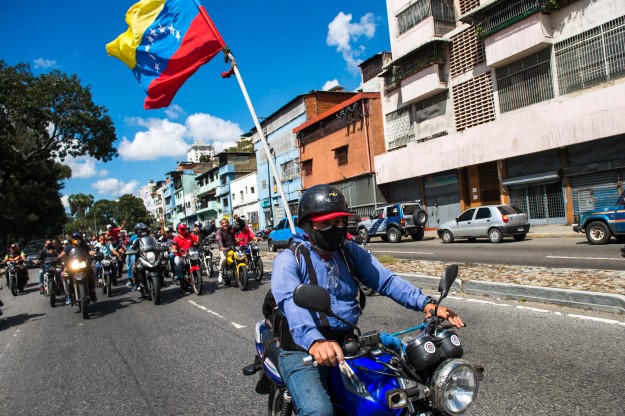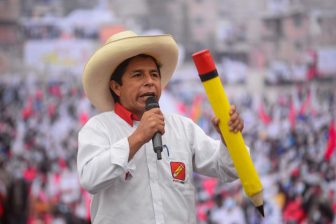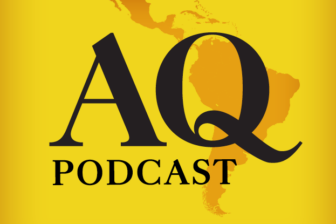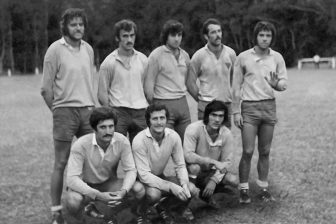Listen to a conversation with the author on the Americas Quarterly Podcast
For the fifth time since 2019, the regime of Nicolás Maduro and Venezuelan opposition leaders will sit at the negotiating table – this time around in Mexico starting on August 13. With the waning influence of the interim government led by Juan Guaidó and a stronger Maduro, the opposition should take this round of talks as an opportunity for a shift in strategy — if they are ready to accept that Maduro and chavismo are unlikely to disappear.
Conditions in Venezuela are simply not there for upcoming talks to provide a “big bang” moment that will dislodge chavismo from the presidential palace and immediately restore democracy. Maduro has become stronger since 2019 after surviving high external pressures while maintaining internal control. While some in the opposition have already accepted this reality, it is key that their leaders do not continue to demand the impossible, meaning ideal democratic elections and chavismo’s immediate moral and political defeat. Instead, demands in Mexico should center around humanitarian and institutional factors that can help build, brick by brick, a new inclusive political system.
Playing the long game won’t be easy, as it requires a battered opposition to accept that past strategies have failed. But to cling to the current stalemate will only render them irrelevant in the future.
Of course, Maduro and his allies still have a choice of their own to make: They can work to rebuild institutions and help Venezuela recover from its multiple crises, while recognizing opposition parties and Venezuelans’ right to choose their own representatives. Alternatively, they can maintain an authoritarian system where human rights are violated and opposition forces are banned from participating.
What Maduro could do is work with the opposition to pursue incremental institutional reforms to help design a democratic system in which chavismo has a future and can potentially win elections without the need to resort to authoritarian tactics. This could imply reforming the electoral law and judicial system, ending indefinite re-election, strengthening decentralization and, most of all, tolerating opponents. If Maduro shows credible commitment to continuous liberalizing reforms, the U.S. and European Union could restructure their economic sanction regimes.
For much of the opposition, it would be hard to grasp a future where chavismo is not extinguished entirely from Venezuelan history. Maduro only has the unconditional support of less than 10% of Venezuelans, but chavismo draws upon wider support basis among Venezuelans, reaching up to at least 30% of the population. It has also created powerful authoritarian institutions, clientelist networks, mechanisms of social control, local brokers across the country, ties to armed groups, a new, loyal economic elite, alliances with powerful, non-democratic international actors, and a polarizing, radical left-wing narrative. None of this can be dismantled overnight. These authoritarian elements will condition any new emerging regime and would automatically give chavismo some power, even outside the government.
This scenario does not mean the opposition give up its ambition of regime change or of justice for the human rights violations committed under chavismo. It does mean taking a more incremental path that, first and foremost, will require a push for more gradual liberalization, learning from other countries’ democratization routes. The opposition could push for the above-mentioned reforms that would help design a more stable and durable political system that provides guarantees for all parties. For this to work, it needs to redefine its discourse and strategies towards an often-neglected actor: the military.
Rather than belittling the military and seeking to fracture it through non-credible threats about foreign interventions, the opposition should elaborate a robust transitional justice scheme and policies that focus on the (re)institutionalization of Venezuela’s military, considering political and economic incentives. If it wants to decrease the prospects for violence before or after a transition to democracy, and help prevent further state fragility, the opposition needs to urgently work on a different framework for the country’s security forces.
Second, the opposition should go through serious internal negotiations to try to repair internal schisms. If it wants to present a viable and inspiring alternative for the next regional and eventual presidential elections, it needs to coordinate its actions. Working only through the so-called G4+ group of leading opposition parties might not be the best approach when trying to convey a pluralistic message, particularly to discontent chavistas. Thus, crafting clear decision-making, conflict resolution and candidate selection mechanisms seems vital to increasing competitiveness in the short and long-run.
Finally, while competing at the polls in November might not ensure landslide victories, it could help re-establish or strengthen ties to constituents, social movements and other grassroots organizations. Rather than hoping for an externally supported “salvation agreement,” it should do the work at home, convincing and inspiring a suffering population that change is possible. Even winning only a few governorships would give opposition parties a much-needed victory and a platform to push for democratization.
Understandably, accepting defeat, particularly when it implies dismantling a once internationally backed interim government is costly, both for domestic and international actors. Yet, insisting on being an interim government and the only legitimate opposition, while having almost no impact on people’s lives, can do more harm than good.
The Mexican Model
If Venezuelan opposition representatives in Mexico are looking for a model of what a long-game strategy might look like, they won’t have to look far. Indeed, Mexico’s own story of ending the 71-year rule of the Institutional Revolutionary Party (PRI) shows that democratization takes time, even decades, and that those processes are not linear. In particular, the opposition can learn from Mexico’s National Action Party (PAN). Rather than consistently deny the regime’s existence and the power structures it had built over decades, the PAN fought to deconstruct those structures through mobilization, organization and participation, including through local and regional elections.
In fact, it took over two decades, which included economic crises, internal party divisions, and the Zapatista uprising in 1994, for the ruling party to decide to slowly move from an authoritarian one-party system to an electoral democracy. During this time, the PRI negotiated new electoral laws and reforms with the opposition, which facilitated better electoral conditions and increased their capacity to locally grow throughout the 1990s. Conditions were not perfect, but they helped opponents show the growing cracks in the PRI’s once-stable hold on elections and present different alternatives to voters.
Mexico’s story is just one example of how authoritarian institutions and actors almost always persist in and shape the democracies that replace them, as numerous scholars have shown. With this in mind, the Mexico negotiations represent a vital opportunity for both Venezuela’s regime and the opposition to accept each other’s existence and resources. Only then can elites and society do the hard work needed to rebuild democracy.
—
Jiménez, PhD, is a postdoctoral research associate at the Latin American Center at the University of Oxford, where she studies comparative democratization, opposition movements and civil resistance.








